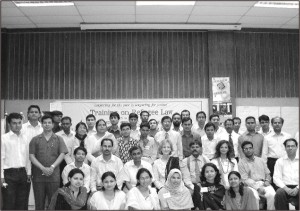Law Event
Training On Refugee Law
Experts urge accession to Refugee Convention
Udatta Bikash
 Legal experts in a training on refugee law recommended to the government of Bangladesh to accede to the Convention Relating to the Status of Refugees of 1951 and it's 1967 Protocol. They also recommended for adopting a national legislation and judicial authority to deal with asylum and refugee issues efficiently.
Legal experts in a training on refugee law recommended to the government of Bangladesh to accede to the Convention Relating to the Status of Refugees of 1951 and it's 1967 Protocol. They also recommended for adopting a national legislation and judicial authority to deal with asylum and refugee issues efficiently.
The programme was organized by the Empowerment through Law of the Common People (ELCOP), a research and advocacy NGO, at the Proshika Human Resource Development Center Trust at Koitta, Manikgonj from 05 to 07 May 2007. The United Nations High Commissioner for Refugees (UNHCR) sponsored it. For the third time, ELCOP organized the training, which is conceptualised in 2005 by Dr. Uttam Kumar Das, National Protection Officer of UNHCR Bangladesh.
"The programme aims to sensitize the participants on refugees' rights and international human rights mechanism for their protection," said Dr. Das in the inaugural session of the programme. "As part of capacity building of national institutions and individuals on refugee law and related issues, this programme is organized."
The agenda of the training included basic understanding of human rights, correlation between human rights law and refugee law, understanding of persecution, asylum, correlation of refugee law and human rights law, refugees' rights within the Constitution and laws of Bangladesh, conceptual background of the internally displaced persons (IDPs) and stateless persons, international legal and institutional mechanism to protect IDPs, UNHCR's role in refugee protection, administration of justice in refugee camps in Bangladesh, identity crisis and legal status of Biharis in Bangladesh, accession to the Refugee Convention, and Bangladeshi refugees in India in 1971 and leasons for today.
On the last day, there was a panel discussion on "Rohingya refugees and challenges for Bangladesh," which was participated by Ms. Pia Prytz Phiri, UNHCR Representative in Bangladesh, Professor Shah Alam and Associate Professor Zakir Hossain. Professor Mizanur Rahman moderated the session.
Recommending for accession to the Refugee Convention, Professor Dr. M. Shah Alam, a former Member of Bangladesh Law Commission said that Bangladesh has been hosting refugees and extending assistance to them for a long time, however did not sign the relevant instruments. The State is also a member to the UNHCR's executive committee (EXCOM) since 1995. "Likely, the government does not want to go under any legal obligation, which is not a right standing," opined the Professor Alam, an expert on International Law. He observed that Bangladesh has already become a party to major international human rights instruments, which obliged it to the protection of refugees' rights anyway. So, no logic sustains here not to be a party to the Refugee convention.
Underscoring the need for a legal regime and institutional mechanism for refugee status determination (RSD) by the government of Bangladesh, Advocate Dr. Naim Ahmed mentioned that this would facilitate an effective protection for the refugees and identification of illegal immigrants in the country. Referring to the Rohingyas from Myanmar, he said that due to absence of a registration mechanism, there is no authentic data on the Rohingya and other foreigners staying in Bangladesh illegally. A significant number of the Rohingyas, got de facto citizenship here. In some villages in Bandarban district bordering Myanmar, the Rohingya immigrants out numbered the local Bangali population.
In the panel discussion, UNHCR Representative, Ms. Pia Prytz Phiri appreciated the role of the people and government of Bangladesh for hosting a large number of refugees from Myanmar for more than a decade. However, she expressed her dissatisfaction and concerns for lack of fundamental rights refugees and their exploitation in camps. She mentioned that UNHCR would propose to the government of Bangladesh to open up the camps by 2009 for ensuring freedom of movement of refugees, right to work and proper education for the children among others. UNHCR is also trying to engage other UN agencies in camps, she informed.
A total of 31 individuals representing law faculties at public and private universities, government (Ministry of Law, Justice and Parliamentary Affairs, Bangladesh Law Commission, Ministry of Food and Disaster Management), Bangladesh Navy, Cost Guard, Bangladesh Rifles, human rights organizations, and media participated in the programme.
The recommendations of different presentations during the three days included: Bangladesh's accession to the Refugee Convention and it's Protocol, adoption of comprehensive national legal framework on refugees, policy on the Rohingyas in Bangladesh, national authority for refugee issues, proper training for government officials and NGO workers dealing with refugees, better and humane treatment for recognized refugees, judicial and legal activism to set up a legal regime, involvement of NGOs and civil society in refugee operations, active role of international community for find out durable solution for the Rohingya problem including their repatriation, effective initiatives of the government of Myanmar and Bangladesh, and continues international support for care and maintenance of refugees in Bangladesh.
The writer is a researcher and practitioner specializing on legal and human rights issues.